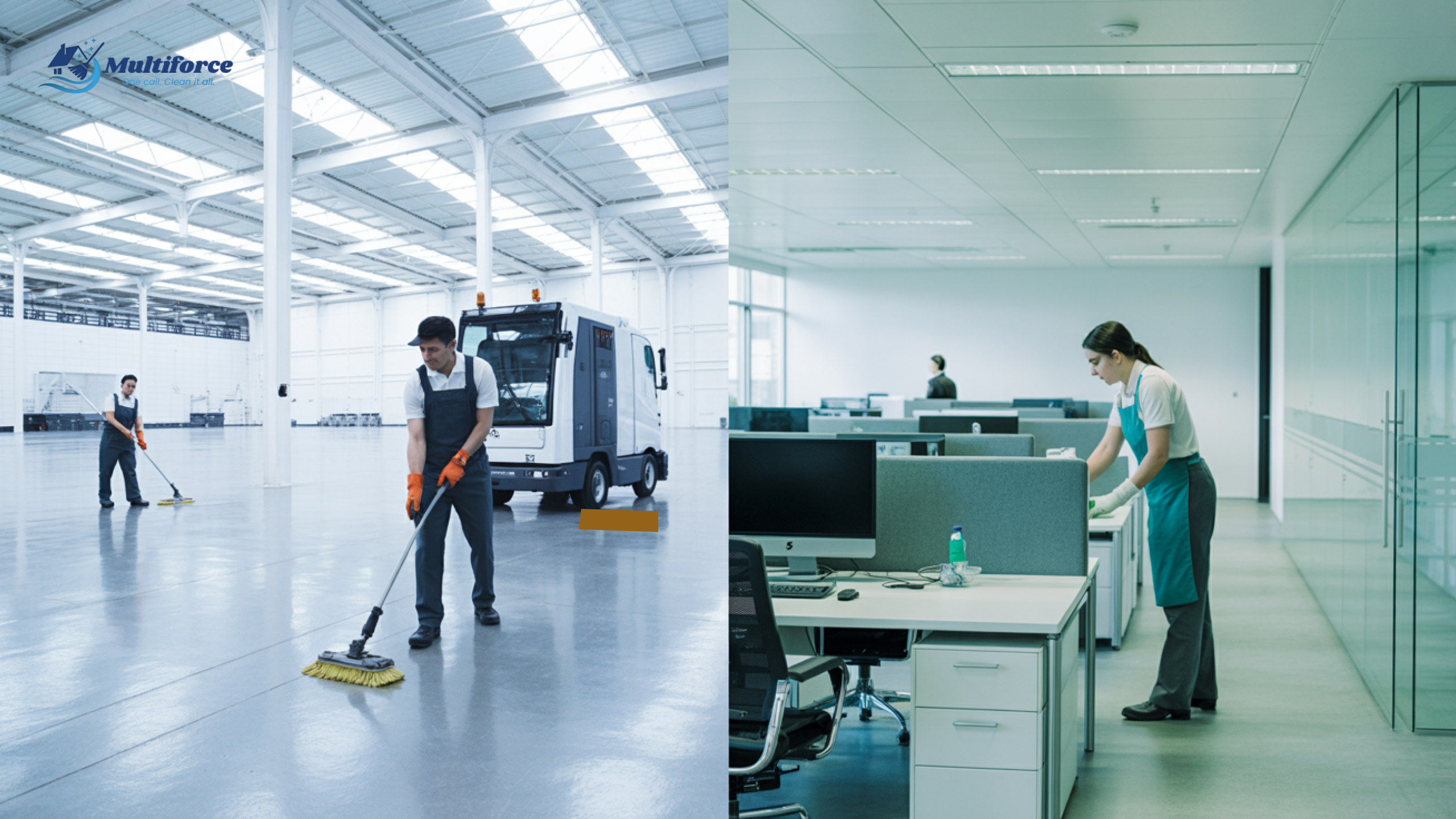Cleaning Services London Blog
Discover practical cleaning tips, industry best practices, and expert advice from London’s trusted cleaners. Whether you’re managing a busy household or running a professional workspace, our insights help you keep your space spotless, fresh, and stress-free.

How Do Commercial Cleaners Differ From Office Cleaners in London?
Cleaning services in London have become increasingly specialised, reflecting the diverse needs of businesses across the city. While many people use the terms commercial cleaning and office cleaning interchangeably, there are clear differences between the two—differences in scope, equipment, training, health and safety requirements, and even industry regulations. Understanding these distinctions helps businesses choose the right service for their environment and ensures compliance, quality, and consistent hygiene. Below is an in-depth look at how commercial cleaners differ from office cleaners in London and why these differences matter.
Scope of Work
Office Cleaners
Office cleaners focus primarily on routine cleaning tasks designed to maintain a tidy and
professional work environment. This usually includes:
● Dusting desks and surfaces
● Emptying bins
● Vacuuming carpets
● Cleaning kitchens, canteens, and break rooms
● Sanitising toilets
● Cleaning meeting rooms
● Wiping down communal equipment (printers, door handles, etc.)
The aim is to keep offices presentable, hygienic, and comfortable for staff and visitors.
Commercial Cleaners
The term commercial cleaning is much broader. It covers any non-residential cleaning
environment, including:
● Warehouses
● Retail stores
● Medical facilities
● Factories
● Schools
● Gyms
● Restaurants
● Hotels
Commercial cleaners may perform all the tasks office cleaners do, plus more intensive,
specialised, or industry-specific cleaning depending on the environment.
Level of Specialisation
Office Cleaning
Office spaces are typically low-risk environments. This means office cleaners don’t usually need
specialist training or equipment beyond standard cleaning tools. Most tasks are straightforward
and consistent from day to day.
Commercial Cleaning
Commercial cleaning often requires:
● Specialised machinery (e.g., industrial floor scrubbers, steam cleaners, pressure
washers)
● Chemical handling expertise
● Knowledge of industrial hygiene standards
● Sector-specific protocols, such as food safety, infection control, or hazardous waste
disposal
For instance, cleaning a medical facility or restaurant requires adherence to strict regulations
that go far beyond normal office cleaning.
Equipment and Technology Used
Office Cleaners
Office cleaning generally involves everyday cleaning tools:
● Mops and buckets
● Vacuum cleaners
● Microfibre cloths
● Basic disinfectants
● Light-duty floor care equipment
Commercial Cleaners
Commercial cleaners may use advanced equipment such as:
● Industrial carpet extractors
● High-grade floor polishers
● Pressure washers
● Steam cleaning machines
● HEPA-filter vacuums (for allergy-sensitive environments)
● Disinfection fogging machines
● Waste-compacting equipment
● Specialist tools for machinery cleaning
The equipment needed depends on the nature of the commercial space.
Health, Safety and Compliance Requirements
Office Cleaners
Office cleaners follow general health and safety guidelines to ensure a clean and safe
workspace. Requirements include:
● Basic COSHH (Control of Substances Hazardous to Health) awareness
● Proper use of cleaning chemicals
● Safe waste disposal
Commercial Cleaners
Commercial cleaning
companies must comply with more stringent regulations, especially in
high-risk sectors such as:
● Healthcare
● Food production
● Education
● Industrial manufacturing
This may involve:
● Full COSHH compliance
● Risk assessments and method statements
● Infection control protocols
● Biohazard handling
● Industry certifications (e.g., ISO standards)
● Adherence to government regulations and sector-specific guidelines
Commercial cleaners in London often undergo more advanced training to meet these
requirements.
Frequency and Scheduling
Office Cleaning
Office cleaning is typically:
● Daily or weekly
● Scheduled outside normal working hours
● Predictable and routine
Office cleaners often visit early morning or late evening to avoid interrupting work.
Commercial Cleaning
Commercial cleaning schedules are more varied:
● 24/7 availability may be required
● Cleaning could be daily, weekly, monthly, or on demand
● Some industries require round-the-clock cleaning teams
● Deep cleaning may be required during shutdowns or production breaks
Commercial cleaners must be flexible to meet operational needs, such as factory downtime or
retail opening hours.
Types of Materials and Surfaces Cleaned
Office Cleaners
Mostly clean:
● Carpets
● Desks
● Glass partitions
● Upholstery
● Basic hard floors
● Electronic equipment surfaces
Commercial Cleaners
Handle a wider variety of materials, such as:
● Industrial flooring (concrete, epoxy, resin)
● Heavy-duty machinery
● Kitchen-grade stainless steel surfaces
● Medical equipment
● Gym equipment
● Restaurant ventilation systems
● High-traffic public space surfaces
Different surfaces require different cleaning agents and techniques.
Cost Differences
Office Cleaning Pricing
Usually lower because:
● Tasks are repetitive
● Equipment costs are minimal
● Training requirements are basic
Office cleaning is often priced per hour or per visit.
Commercial Cleaning Pricing
Generally higher because:
● Equipment and machinery are expensive
● Specialist training is required
● Jobs may be more labour-intensive
● Compliance and certification add overhead costs
● Deep cleaning or sanitisation may require skilled teams
Commercial pricing often factors in risk, industry regulations, and project complexity.
Staff Training and Expertise
Office Cleaners
Require general cleaning knowledge and good time management.
Commercial Cleaners
May require:
● Health and safety certification
● Biohazard training
● Food hygiene Level 2 or higher
● First-aid training
● Specialist equipment operation training
● Infection control certification
Commercial cleaners must be capable of adapting to many types of environments.
Conclusion
While both office cleaners and commercial cleaners work to maintain cleanliness and hygiene,
the key differences lie in the scope, specialisation, equipment, training, and regulatory
requirements. Office cleaning focuses on maintaining a professional working environment,
while commercial cleaning spans a much wider range of industries with unique needs and
higher standards.
Find Us
Call Us
Email Now
Address
Finchampstead Rd, Finchampstead, Wokingham RG40 3RG, United Kingdom
